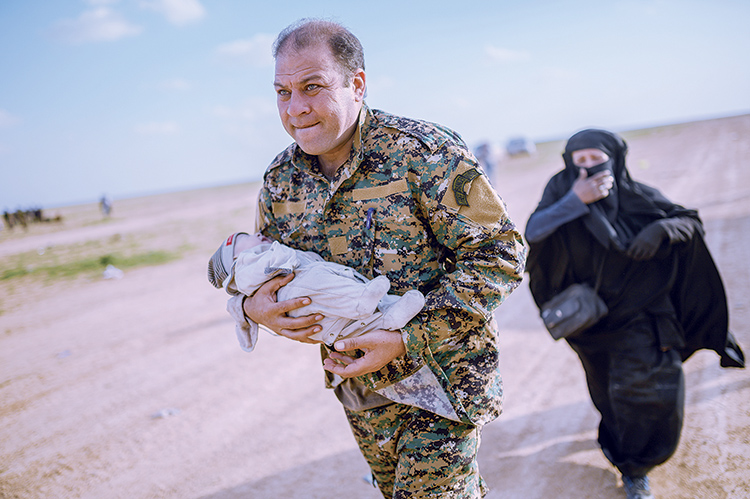
OMAR OIL FIELD:
US-backed Syrian forces warned Sunday they were struggling to cope with an
outpouring of foreigners from the Islamic State group's imploding
"caliphate", urging governments to take responsibility for their
citizens. The Kurdish-led Syrian Democratic Forces have evacuated nearly 5,000
men, women and children from the jihadist redoubt since Wednesday, moving
closer to retaking the last sliver of territory under IS control.
"The numbers
of foreign fighters and their relatives that we are holding is increasing
drastically," Kurdish foreign affairs official Abdel Karim Omar said.
"Our current infrastructure can't handle the mass influx", he said.
Syria's Kurds have repeatedly called on foreign countries to repatriate their
citizens, but most have been reluctant to allow battle-hardened jihadists and
their relatives back home due to security concerns.
At the height of
its rule, IS imposed its brutal interpretation of Islamic law across territory
straddling Syria and Iraq that was roughly the size of the United Kingdom. But
more than four years after IS declared a cross-border "caliphate",
the jihadists have lost all but a tiny patch of land in the village of Baghouz
near the Iraqi border.
After years of
fighting IS, Syria's Kurds say they hold hundreds of suspected IS fighters and
their relatives. "As thousands of foreigners flee Daesh's crumbling
caliphate, the burden which is already too heavy for us to handle is getting even
heavier," SDF spokesman Mustefa Bali said on Twitter late Saturday, using
an Arabic acronym for IS.
"This will
remain as the biggest challenge awaiting us unless governments take action and
fulfil their responsibilities for their citizens," he said. No evacuations
were reported from the enclave on Saturday, but the two batches that left on
Wednesday and Friday included Europeans, Iraqis and nationals of former Soviet
countries, according to the SDF.
Crammed prisons
Around 46,000
people, including a large number of foreigners, have streamed out of IS's
shrinking territory since early December, according to the Syrian Observatory
for Human Rights, a Britain-based war monitor. While civilians are trucked
north to Kurdish-run camps for the displaced, suspected jihadists are sent to
SDF-controlled prisons. Omar said SDF "detention centres can't accommodate
all the fighters" coming out of the last IS pocket.
The evacuation of
men, women and children has put a strain on Kurdish-run camps for the displaced,
especially the Al Hol camp, which now shelters more than 40,000 people.
"There is a lot of pressure on us, especially in Al Hol, where in addition
to the relatives of IS fighters you have a large displaced population,"
Omar said.
On Thursday, nearly
2,500 evacuees arrived at Al Hol, compounding already dire conditions inside
the crammed settlement, the UN's humanitarian coordination office OCHA said.
"Thousands more are expected in coming hours/days at Al-Hol camp, putting
a further strain on basic services," it tweeted Friday. "This sudden influx presents huge
challenges to the response-additional tents, non-food items, water and
sanitation and health supplies are urgently needed." The International
Rescue Committee on Friday said 69 people, mostly children, had died on the way
to Al-Hol, or shortly after arriving in past weeks.
Security concerns
The battle for
Baghouz is now the only live front in Syria's war, which has killed more than
360,000 people and displaced millions since 2011. The SDF say they are trying
to evacuate remaining civilians through a corridor before pressing on with a
battle to crush the jihadists unless holdout fighters surrender. Some 2,000
people are believed to remain inside Baghouz, including foreigners, according
to the US-backed force.
Many European
countries are now confronted with the dilemma of whether to bring back their
citizens who travelled to join the group and prosecute them at home, or bar
them from entry over security concerns. On Friday, the family of Shamima Begum,
19, said it would challenge the British government's decision to revoke her
citizenship. Begum, who travelled to Syria in 2015 aged just 15, faced being
left stateless after Britain revoked her citizenship, and Bangladesh, where her
parents are from, said it did not want her. On Thursday, the father of Hoda
Muthana, 24, sued to bring her home after President Donald Trump's
administration declared she was not a US citizen. - AFP









